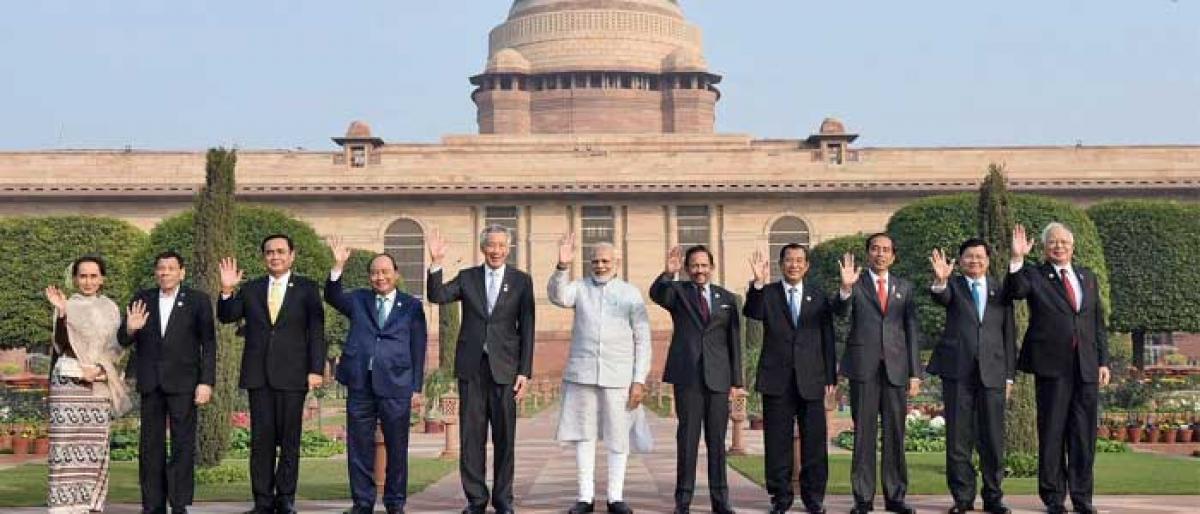Live
- MacBook Air M3 Hits Lowest Price in India: Find Details
- High Court Adjourns Hearing on Allu Arjun's Petition to 4 PM
- Pawan Kalyan praises Chandrababu Naidu at Swarnandhra Vision 2047 document launch
- Chirec International looks to transform education with Chirec 2.0 vision
- Telangana CM Revanth Reddy Responds to Allu Arjun's Arrest in Delhi
- Uddhav Thackeray to PM Modi: Pay attention to Bangladesh, act to end Hindus’ misery
- Allu Arjun Arrested: KTR Reacts on X, Calls Arrest Unfair
- Bold steps by Modi govt in reviving Indian heritage, culture: Union Minister
- What are the charges against Allu Arjun: Understanding the Charges Against Him
- Allu Arjun Objects to Arrest Procedure, Requests Breakfast and Change of Clothes
Just In

As the two-day ASEAN summit gets underway, India\'s ‘Look East’ policy gets further strengthened. It also marks the quarter of a century\'s bilateral ties with ASEAN. This outreach is important for our country for several reasons, most important of all being the aggressive push given by China in the region to take full control over the economies with its investments and by unleashing uncertainties.
As the two-day ASEAN summit gets underway, India's ‘Look East’ policy gets further strengthened. It also marks the quarter of a century's bilateral ties with ASEAN. This outreach is important for our country for several reasons, most important of all being the aggressive push given by China in the region to take full control over the economies with its investments and by unleashing uncertainties.
A strong regional coalition is thus essential for India to balance China. It should be noted that ASEAN group countries are not happy with China which has maritime boundary issues with many of these smaller countries. The very theme of the New Delhi summit is 'Shared Values, Common Destiny,’ emphasises the importance of a shared approach to the problems haunting the world including climate change and terrorism – In addition, these countries also face Chinese expansionism.
Maritime cooperation and security are vital areas to be discussed in the summit. Prime Minister Narendra Modi will be keenly watched by the ASEAN leaders as he presents his vision of the future trajectory of India-Asean ties. The Prime Minister has already indicated to the Eastern neighbours that they are all too important for India by inviting, in an unprecedented fashion, the heads of the 10 countries as guests for the Republic Day parade. Since 2014, India has significantly upgraded its “Look East” policy to “Act East” policy.
In the past three years, Modi, former President Pranab Mukherjee and former Vice-President Hamid Ansari visited all the 10 ASEAN countries and Indian naval ships made port calls at Singapore, Indonesia, Malaysia, Thailand, Vietnam, Cambodia, the Philippines and Brunei last year, according to an Indian ministry of defence statement. Last year, India marked 15 years of summit-level engagement with Asean and five years of strategic partnership with the bloc. Coincidentally, ASEAN marked 50 years of its establishment in 2017.
India views the ASEAN region as an economic partner, given its high growth rates, and its approximately 600 million people as a market. New Delhi has targeted $200 billion in bilateral trade with ASEAN countries by 2022. The South-East Asian region is economically very vibrant with a lot of potential. This is a vibrant economic and commercial space for India. Already the ASEAN is India's fourth largest trading partner and India is their seventh largest trading partner. India's investment in the last two decades had been $70 billion and the country looks to enhance it further.
India is also looking at ASEAN as its development partner, especially with regard to improving the economic conditions in its insurgency-wracked Northeast. Singapore has set up a skill development centre in Assam. India-ASEAN strategic cooperation assumes greater significance against the background of a rapidly growing China.
Ahead of the leaders’ summit, India and Vietnam signed two pacts including an implementation arrangement between the Indian Space Research Organisation and the National Remote Sensing Department of Vietnam for establishment of tracking and data reception station and data processing facility in Vietnam under ASEAN India Space Cooperation. Such ties are not just beneficial to the country but also vital to the stability of the region under threat from China.

© 2024 Hyderabad Media House Limited/The Hans India. All rights reserved. Powered by hocalwire.com







